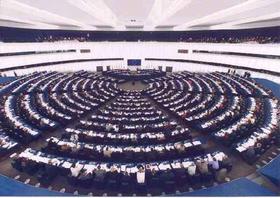Failure to apply EU law

- European Parliament (photo) (Photo: www.civitas.org.uk/eufacts/FSINST/CIT3.htm)
Failure to apply EU law
Generally, the EU has two different types of law: regulations and directives.
Regulations apply directly and have direct effect in all member states. It is not permitted to transform them into national laws.
Directives must be transformed into national laws to have effect. Member states are bound to carry this out. If they do not, other member states or the Commission may introduce an action at the EU Court for a so-called failure to fulfil an obligation.
The EU Court also decided that certain directives have direct effect even if they have not been transformed into national law. Citizens can thus have rights according to an EU directive and be liable to compensation from the member state that failed to transform it into national law. This was decided by the EU Court in the important Francovich case.
The EU Court has a monopoly to interpret EU law according to Article 344 TFEU in the Lisbon Treaty.
Links
See also Factortame case
